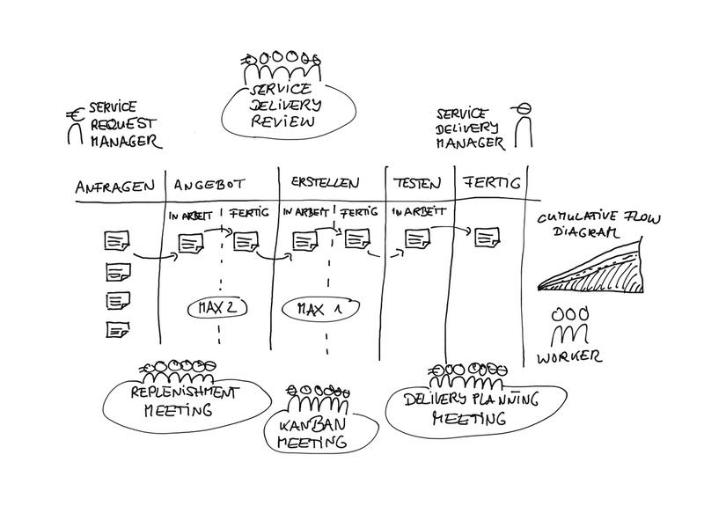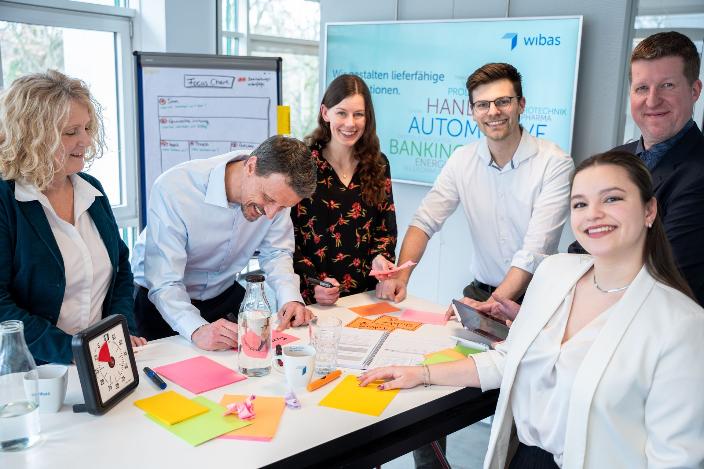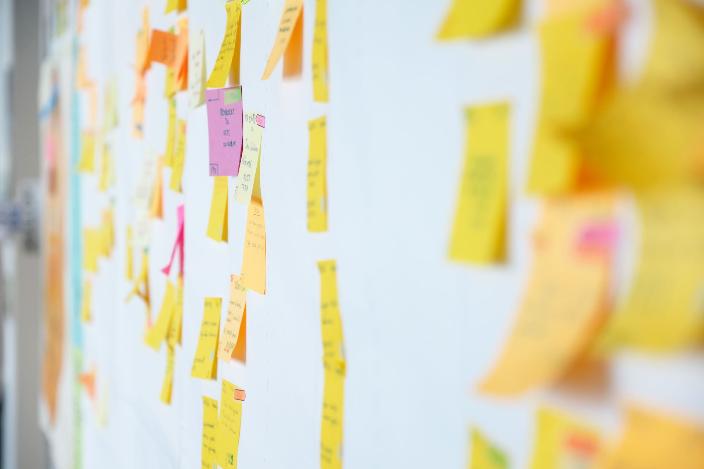Agile Frameworks
Kanban: more focus on service, less waste
Kanban brings work into flow, focuses service orientation and leads to less waste - from the first idea to its final implementation. Kanban makes bottlenecks visible, reduces waiting and lead times. This method is used at all levels of the company to get work done effectively and efficiently in a team.
Call Julia Stiegelmayer.
"Kanban is much more than the typical Kanban boards with cards. Let me show you what else the framework can do."
How does Kanban work?
When you hear Kanban, the first thing you might have in mind are the typical Kanban boards with cards. These boards are used to visualize the flow of work. But this is only the first of six practices of the Kanban framework:
-
Visualize the workflow.
- Limit parallel work (WIP - work in progress).
- Manage the flow of work.
- Make process rules explicit.
- Implement feedback loops.
-
Improve together, develop experimentally.
Besides these practices, the Kanban method knows other elements:
- three service delivery principles
-
three change management principles
Where does Kanban come from?
Based on a pull system, Kanban originated in Japan at the end of the 1940s.
years in Japan. The inventor of the Kanban system, Toyota's former production manager
Taichii Ohno, shaped the future of one of the most transparent
of one of the most transparent and helpful tools in today's
production and project management. He invented both the
Toyota Production System as well as the Japanese management concept Kaizen.
Kanban for modern knowledge work was coined by David J. Anderson. It is derived from the insights of many years of practical experience, originally published in the book "Kanban: Successful Evolutionary Change for Your Technology Business".
One advantage: results are finished faster.
Using Kanban has numerous advantages.
- Through visualization and the pull principle, teams become more flexible and can organize their work independently. Their work progress becomes transparent and thus visible to others.
- Another benefit: You work at a sustainable pace because you can predict how much time a task will actually take.
- They improve quality through firmly established feedback loops and avoid waste through the pull mechanism.
- You focus by limiting parallel work (WIP limit) - and results get done faster.
- The best thing about it: Kanban improves communication and teamwork. The best prerequisite for good cooperation, which leads to faster results and is fun for everyone.
Few rules, versatile
 Since Kanban has only a few rules, it is useful and applicable in many work situations. Typical applications are:
Since Kanban has only a few rules, it is useful and applicable in many work situations. Typical applications are:
- Organization of similar workflows in a team, e.g. in a call center or in IT support
- Organization of development flows
- Portfolio organization
- Organization of own work ("Personal Kanban")
How can you start?
Getting started with Kanban is quite simple and lives on three basic principles:
- Start where you are at the moment
- Agree with others that incremental and evolutionary change is the goal.
- Respect the existing process and existing roles, responsibilities, and job titles.
The best way to start is with our Basics workshop - oriented to your individual needs - and get all team members on board. Part of this workshop is a simulation that makes the principle tangible and ensures aha effects for all participants. Afterwards, we set up a prototypical Kanban board for your work as it works at the moment. How this works, you will learn our Blog post "Guide to setting up a Kanban".. Get started and improve your system step by step! We will be happy to accompany you.
We will be happy to help you. Contact us or make an appointment directly with one of us. We are Timo Foegen, Yvonne Fischer, Tina Eisoldt, Daniel Votta and Lutz Koch.
"We look forward to talking to you about your requirements and finding the perfect support for you."

Kanban consultation hour (every 1st Wednesday of the month)
Do you have questions about Kanban or workflow? You can find answers to your questions here. Our colleague Astrid Meyser offers a Kanban consultation hour every first Wednesday of the month. Here you can discuss all your questions about Kanban, the introduction or establishment of a system, key figures or potential for improvement.

Blog article: Improve your Scrum with Kanban? You can.
Existing Scrum or Scrumban teams can benefit from Kanban. A customer report from outside IT shows how individual aspects of Kanban can improve a muddled situation.
Register now: Kanban System Design
Discover the benefits of Kanban in this 3-day training with certificate.
Register now: Kanban System Improvement
In this training with completion you will learn how to further develop Kanban - beyond the team level.
Kanban in a nutshell: Impulses for frequently asked questions
Whether you've just started your own team, are fresh from Scrum training or have been with us for some time: sooner or later [...]
Kanban Trainings
We teach you how to do Kanban yourself and how to do it better - with certified training courses from Kanban University.
Kanban Compact
The Kanban Framework for your pocket. Short. Compact. Concrete.
Start with Kanban
If you want to get started with Kanban, we will work with you to organize a joint launch so that you can get started quickly.
Improve your Scrum with Kanban? You can.
Existing Scrum or Scrumban teams can benefit from Kanban. A customer report from outside IT shows how individual aspects of Kanban [...]
Scrum, Kanban, Design Thinking: What fits for you?
We contrast the three main agile frameworks.
Your expert for Kanban:
Sascha Geßler
wibas GmbH
Sascha Geßler
Otto Hesse St. 19B
64293 Darmstadt
+49 6151 503349-0
